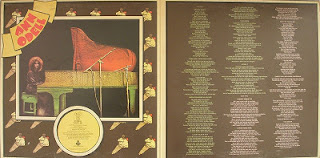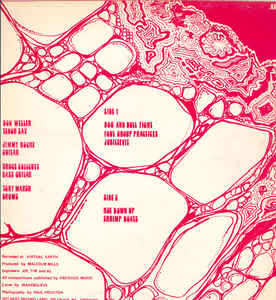This is another album I've loved dearly since I first heard it a long time ago. It's basically classical music done by a chamber quartet but the quality of the compositions always just astounded me, with the usual comments here about how the level of beauty rivals anything one would hear in a modern classical European concert hall, or even bests those, if you bought a ticket for a really tired old classic like Tchaikovsky's Swan Lake or what have you in the hopes maybe of falling asleep really soundly.
The track called The Stables is so gentle and intelligent in terms of the advanced chord changes moving upwards and then weaving back and forth with those elegant lines:
Most of the remainder is as beautiful as that piece. Unfortunately there wasn't enough music to fill up 2/3 of an hour and as a result the soundtrack was stuffed with annoying monologues. Btw, the play itself and the movie that followed starring Sir Richard Burton was famous back in the day, I recall watching the latter and being horrified at the mix of neurotic pretentiousness, sexual obsession typical of the times, and cliched treatment of the tortured philosopher-psychiatrist. In those days, you might remember, or maybe you weren't born then, psychiatrists were very well respected, not quite the drug-pushing invisible men they are today's insurance-driven medical sphere.
Now, turning as usual to our favourite cinematic source, from imdb:
Martin Dysart (Richard Burton) is a psychiatrist in a psychiatric hospital. He begins with a monologue in which he outlines the case of 17-year-old Alan Strang. He also divulges his feeling that his occupation is not all that he wishes it to be and his feelings of dissatisfaction and disappointment about his barren life. Dysart finds that there is a never-ending supply of troubled young people for him to "adjust" back into "normal" living; but he doubts the value of treating these youths, since they will simply return to a dull, normal life that lacks any commitment and "worship" (a recurring theme). He comments that Alan Strang's crime was extreme but adds that just such extremity is needed to break free from the chains of existence. A court magistrate, Hesther Saloman, visits Dysart, believing that he has the skills to help Alan come to terms with his violent acts involving six horses.
At the hospital, Dysart has a great deal of difficulty making any kind of headway with Alan (Peter Firth), who at first responds to questioning by singing TV advertising jingles. Slowly, however, Dysart makes contact with Alan by playing a game where each of them asks a question, which must be answered honestly. He learns that, from an early age, Alan has been receiving conflicting viewpoints on religion from his parents. Alan's mother, Dora Strang (Joan Plowright), is a devout Christian who has read to him daily from the Bible. This practice has antagonized Alan's atheist father, Frank Strang (Colin Blakely), who, concerned that Alan has taken far too much interest in the more violent aspects of the Bible, destroyed a violent picture of the Crucifixion that Alan had hung at the foot of his bed. Alan replaced the picture with one of a horse, with large, staring eyes.
During his youth, Alan had established his attraction to horses by way of his mother's biblical tales, a horse story that she had read to him, western movies, and his grandfather's interest in horses and riding. Dysart reveals a dream he has had, in a Grecian/Homeric setting, in which he is a public official presiding over a mass ritual sacrifice. Dysart slices open the viscera of hundreds of children, and pulls out their entrails. He becomes disgusted with what he is doing, but desiring to "look professional" to the other officials, does not stop.
Alan's sexual training began with his mother who told him he could find true love and contentment by way of religious devotion and marriage. During this time Alan also begins to show a sexual attraction to horses, desiring to pet their thick coats, feel their muscular bodies and smell their sweat. Alan reveals to Dysart that he had first encountered a horse at age six, on the beach. A rider (John Wyman) approached him, and took him up on the horse. Alan was visibly excited, but his parents found him and his father pulled him violently off the horse. The horse rider scoffed at the father and rode off.
In another key scene, Dysart hypnotizes Alan, and during the hypnosis, Dysart reveals elements of his terrifying dream of the ritual murder of children. Dysart begins to jog Alan's memory by filling in blanks, and asking questions. Alan reveals that he wants to help the horses by removing the bit, which enslaves them.
After turning 17, Alan took a job working in a shop selling electrical goods, where he met Jill Mason (Jenny Agutter), an outgoing and free-spirited young woman in her mid-20s. She visits the shop wanting to purchase blades for horse-clippers. Alan is instantly interested when he discovers that Jill has such close contact with horses after she tells him that she works for a local stable owner. Jill suggests that Alan work for the owner of the stables, Harry Dalton (Harry Andrews), and Alan agrees.
Dysart meets with Dalton who tells him that he first held Alan to be a model worker, since he kept the stables immaculately clean and groomed the horses, including one named "Nugget." Through Dysart's questioning, it becomes clear that Alan is erotically fixated on Nugget (or 'Equus') and secretly takes him for midnight rides, bareback and naked. Alan also envisions himself as a king, on the godhead Equus, both destroying their enemies.
In the climax, Dysart gives Alan a placebo "truth pill" and revealing a tryst with Jill, begins to re-enact the event. Jill, who had taken an interest in Alan, had asked him to take her to a porno theater after he confided in her that he never had sex before and Jill apparently decided to show him "how it's done". While there, they both ran into Frank. Alan was traumatized, particularly when he realized that his father was lying when he tried to justify his presence in the theater. However, this occurrence allows Alan to realize that sex is a natural thing for all men... even his father. Alan walks Jill home after they leave. She convinces Alan to come to the stables with her.
Once there, Jill seduces Alan and the two start having wild sex. However, Alan breaks this off when he hears the horses making noises in the stables beneath. Jill tries to ask Alan what the problem is, but he shouts at her to leave. After Jill puts back on her clothes and walks out of the stables, the stark nude Alan begs the horses for forgiveness for having pre-marital sex, as he sees the horses as God-like figures. "Mine!...You're mine!...I am yours and you are mine!" cries Equus through Dysart's voice, but then he becomes threatening: "The Lord thy God is a jealous God," Equus/Dysart seethes, "He sees you, he sees you forever and ever, Alan. He sees you!...He sees you!" Alan screams, "God sees!" and then he says "No more. No more, Equus!" Alan then blinds the six horses in the stable with a steel spike, whose eyes have "seen" his very soul. Dalton is the one who runs in and subdues Alan before calling the police. After finishing his story to the shaken Dysart, Alan is taken away in a straightjacket to a isolation cell of the hospital.
The final scene has another monologue by Dysart questioning the fundamentals of his practice and whether or not what he does will actually help Alan, as the effect of his treatment will remove Alan's humanity which includes his intense sexual and religious commitment, and his worship of the horses as well.
Pretty weird, huh, if you actually managed to make it this far? Really, the play must have been from the sixties, no one today would tolerate such ridiculous and pretentious nonsense, with aspects of bestiality, autism, etc., not to mention the ludicrously portrayed psychiatrist. And I think it wouldn't even make sense without the looming presence of that bizarre sexual obsessive, Sigmund Freud.
The OST came with another from 1967 called Whisperers by John Barry on a two for one, which I threw in too. Unfortunately it's a little bit more generic than the Equus composition, which is tragically too short. The first track, Main Titles, from the 1967:











































